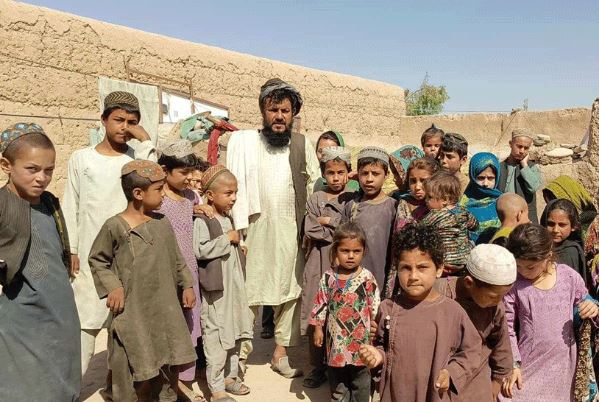By: Humayoon Babur | May 20, 2024
(Kubha News)—In the heart of central Tarinkot, Uruzgan province of Afghanistan, resides 57-year-old Muhammad Sadiq, shouldering the responsibility of caring for his extensive family consisting of 52 children and four wives within the confines of a cramped three-room rented house.
Despite his profound love for his children, economic challenges have left him grappling with the inability to adequately provide for their needs, particularly in terms of education.
With 28 sons and 24 daughters, Muhammad Sadiq shared the heart-wrenching revelation that nine of his children have tragically passed away, amplifying the weight of his responsibilities to a total of 61 offspring.
Ranging from the tender age of six months to 20 years, the surviving children crave for opportunities beyond their reach. “Having many children is a pleasure,” Sadiq said, “but I wish I had the ability to feed them.”
The family’s plight is exacerbated by their dire living conditions. Their modest abode, recently ravaged by heavy rains, struggles to accommodate the sheer size of their family, comprising approximately 60 individuals.
Muhammad Sadiq’s daily struggle revolves around ensuring his children have enough to eat, while the prospect of education remains —an elusive dream.
He has fervently appealed to the Taliban rulers and charitable organizations for support in providing educational opportunities for his children.
Among his children, 14-year-old Habibullah toils at a car dealership in Tarinkot city, earning a meager monthly wage of 1,500 afghanis (USD 20.94).
Despite his youthful aspirations for education, Habibullah laments that the opportunity remains out of reach without external support.
Similarly, his 10-year-old daughter, Bibi Warisah, nurtures a fervent ambition to become a doctor. “I wish to study at school,” she voiced, underscoring the urgent need for assistance in realizing her educational aspirations.
In September 2019, a significant event unfolded in the form of a U.S. night-time assault on a remote compound, resulting in the loss of at least 20 lives.
In war-torn Afghanistan, having many children carries numerous burdens. Around 20% of Afghan children work to support their families, engaging in jobs like street vending and shoes polishing.
These young workers face dire consequences: they miss out on education, endure violence, and suffer from extreme weather conditions.
Efforts to address this crisis must prioritize education and enforce laws protecting children from exploitation.
Community members residing in the Khairo Karez area bear witness to the Sadiq family’s daily struggles and extend a helping hand whenever possible.
Advocating for government intervention and aid agency support, they emphasize the critical importance of providing shelter, sustenance, and educational opportunities for Sadiq’s children.
Amidst Afghanistan’s enduring challenges, Muhammad Sadiq’s story serves as a poignant reminder of the profound need for humanitarian aid and educational support in the region.
As the international community grapples with the complexities of the Afghan landscape, narratives like Sadiq’s underscore the urgent imperative of extending a lifeline to vulnerable communities in their quest for a brighter future.
